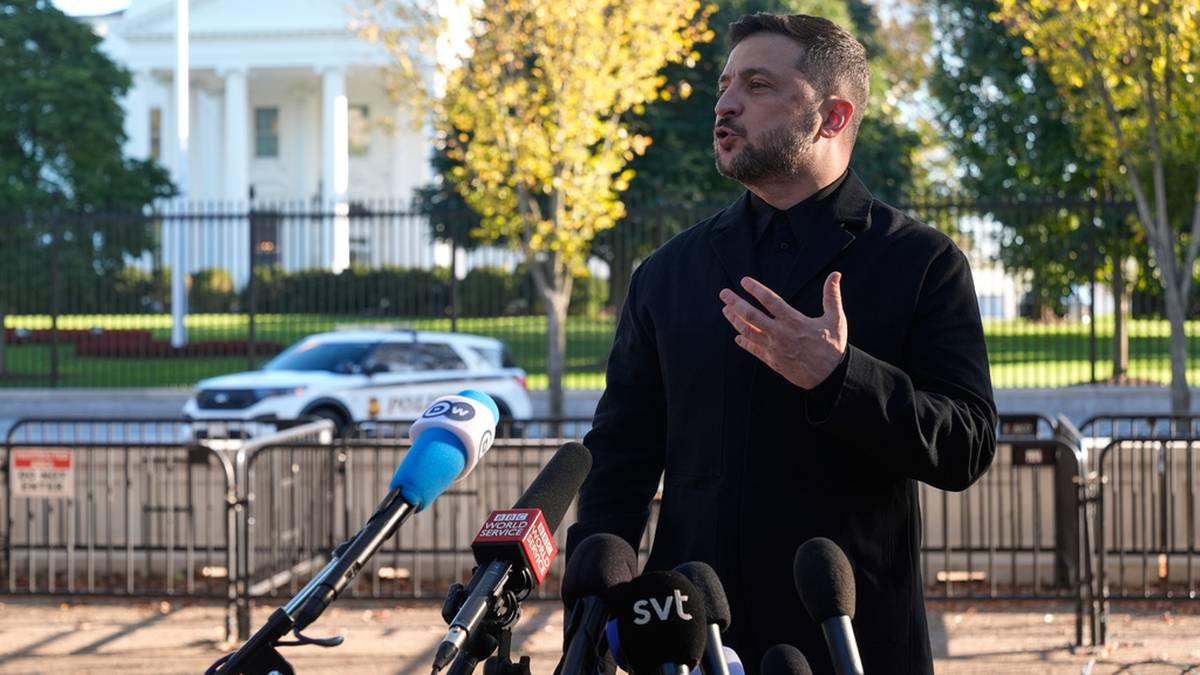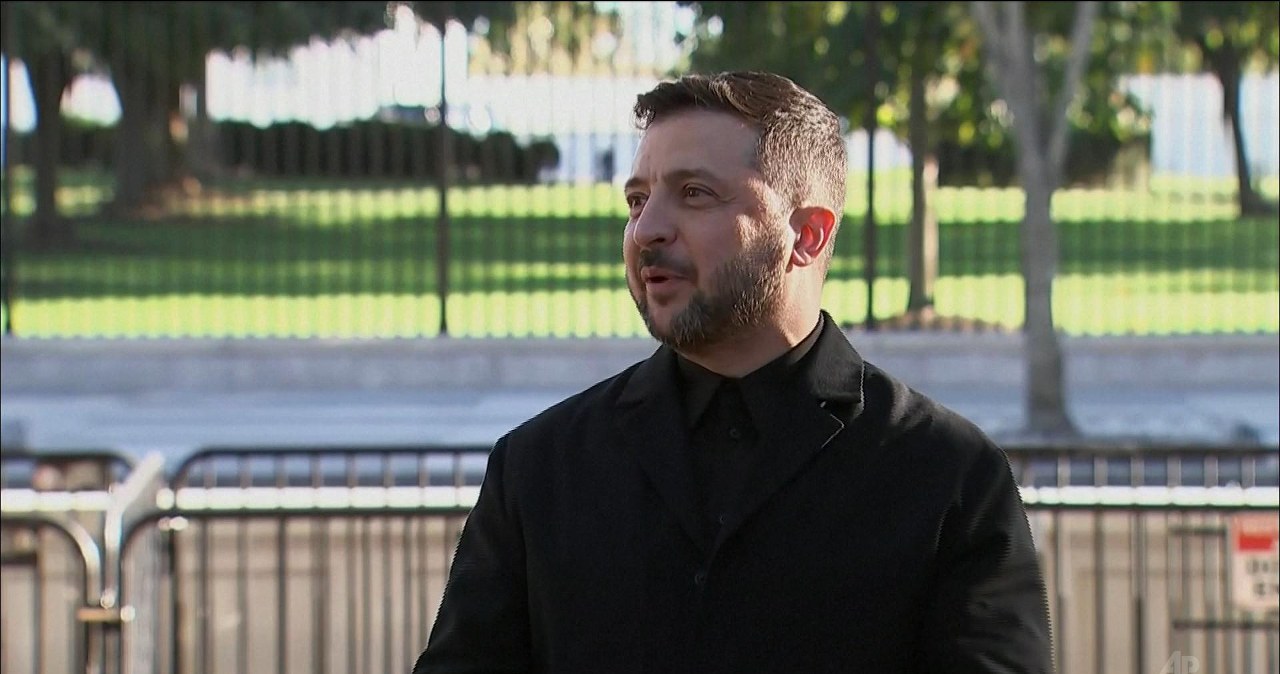Capitulation: Yen Plunges, Nikkei Soars After BOJ’s Uchida Says „Will Not Raise Rates When Markets Are Unstable”
It hasn’t been even a full week since the BOJ’s catastrophic decision to hike rates by 25bps in a slowing, deflating economy, a decision which we said the BOJ would make for purely political reasons, yet which touched on in our preview last week….
BOJ preview: whatever is the dumbest possible thing that can happen, is what will happen. 100% guaranteed
— zerohedge (@zerohedge) July 30, 2024
… a decision which we also said would be reversed on very short notice…
Who will cut first: BOJ or Fed
— zerohedge (@zerohedge) August 2, 2024
… once the Japanese stock markets crashed after the weekend, just as expected…
There it is
*JAPAN’S TOPIX INDEX EXTENDS DROP TO MORE THAN 6% https://t.co/xh4zeBXpZa
— zerohedge (@zerohedge) August 5, 2024
… and not just any crash but the biggest point crash in Nikkei and Topix history, surpassing even Black Monday and guaranteeing that whatever political considerations were prevalent when the BOJ decided to throw away its own rulebook and follow political pressure to spike the yen in order to contain inflation – while also crashing the stock market by 20% in 3 days – would be promptly overruled and the BOJ would capitulate in due course, as we explained just last night in „After A „Perfect Storm In The Vol Market”, Goldman Says „We Are About To Enter The Central Bank Response Phase”, in which we wrote that „we are not going down because of recession but because of an unwind of circa 20trilion carry trades” adding that “only BOJ can stop this.”
And while we were correct in predicting that „the BOJ has no choice and is merely prolonging the inevitable”…
Why the BOJ has no choice and is merely prolonging the inevitable: „at a gross balance sheet value of around 500% GDP or $20 trillion, the Japanese government’s balance sheet is, simply put, one giant carry trade.” – DB pic.twitter.com/gAtt4eu0HO
— zerohedge (@zerohedge) August 5, 2024
… little did we know just how soon the BOJ would stop prolonging the inevitable – and admit it has no choice – because less than a day later, the Japanese central bank confirmed everything we said in the past 72 hours when BOJ Deputy Governor Shinichi Uchida capitulated shortly after 10am local time, when, pressed for answers to the ongoing market collapse, he sent a strong dovish signal in the wake of historic financial market volatility in Japan by pledging to refrain from hiking interest rates when the markets are unstable.
Uchida tried to save face, but in the end the only thing the market heard is that rate hikes are basically over after last week’s teeny, tiny 10-25bps rate increase unleashed a global deflationary tsunami and crashed Japan’s market.
“I believe that the bank needs to maintain monetary easing with the current policy interest rate for the time being, with developments in financial and capital markets at home and abroad being extremely volatile,” Uchida said in a speech Wednesday to local business leaders in Hakodate, northern Japan, where apparently he did not make a Freudian slip confusing „tightening” with „easing” because he actually did mean easing!
Uchida spoke after Japanese stocks crashed in predictable reaction to the BOJ crushing the yen carry trade… or rather predictable to anyone but the erudite policymakers at the BOJ.
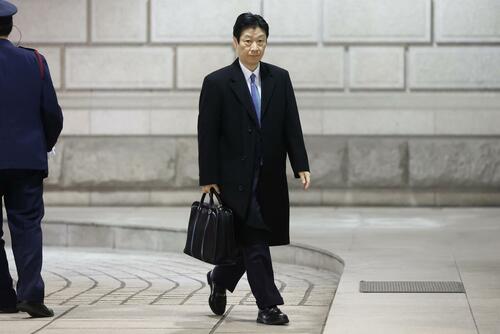
More importantly, the deputy chief suggested that the bank will carefully consider the state of financial markets in future decisions on rate policy, and as noted above, will refrain from any more rate hikes when markets are unstable.
“In contrast to the process of policy interest rate hikes in Europe and the United States, Japan’s economy is not in a situation where the bank may fall behind the curve if it does not raise the policy interest rate at a certain pace,” Uchida said. “Therefore, the bank will not raise its policy interest rate when financial and capital markets are unstable.”
Well, dear central banker, a quick primer: this is called passive aggressive forward guidance. The Japanese market will now NEVER become „stable”, in doing so preventing any more rate hikes, and in fact will become so unstable the BOJ will have to cut again.
According to Bloomberg, Uchida, a dovish veteran policy architect, who was heavily involved with designing the BOJ’s massive monetary easing program that ran for more than a decade, is widely known for playing a prominent role in mapping out Governor Ueda’s journey toward normalizing policy. The BOJ ended the ultraeasy policy in March with its first hike in 17 years. And it now appears that the BOJ’s attempts to renormalize policy ended with a thud on the morning of August 7.
For confirmation one has to look no further than the yen which immediately tumbled by more than 2% against the dollar…
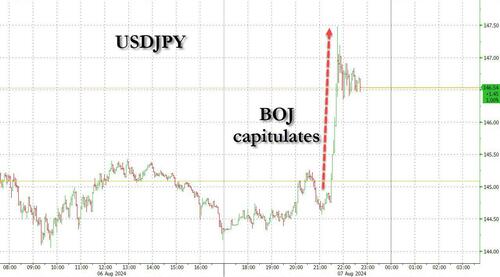
…. and Japanese stocks soared immediately after his comments…
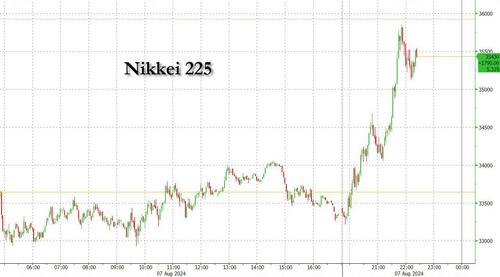
… which were not only the first public remarks by a BOJ board member since the bank hiked interest rates on July 31, but also the first remarks to admit that last week’s rate hike had been a catastrophic policy error.
And now, we sit back and watch as the carry trade is put back on, and the BOJ desperately tries to refloat the $20 trillion carry trade titanic which as we reported on Sunday night, is now in the process of sinking. The good news, at least for the Kamala administration, is that the BOJ’s panicked concession will enable US stocks to surge once again as the carry trade is promptly re-established.
The sellside brigades, especially those who were predicting a 130 USDJPY in the very near future, were quick to jump on the realization that the BOJ just capitulated:
- According to Credit Agricole CIB, Uchida comment confirms the BOJ will likely be gun-shy about hiking rates again soon (or ever) which will weigh on the the yen.
- “The 3-way meeting between the FSA, MOF and BOJ left the BoJ substantially chastized with new Vice Minister for International Affairs, Mimura, saying the BoJ will pay attention to the volatility in financial markets,” said the bank’s FX strategist David Forrester.
- The Bank of Singapore also chimed in, writing that „the outsized yen rally is making policymakers uncomfortable”, which is evident from BOJ Deputy Governor Shinichi Uchida’s comments on interest rates.
- And the punchline comes from UBS trader Alex Limwho writes that „the last thing the BoJ wants is to be blamed for triggering one of the sharpest market selloffs that coincidentally followed its hawkish July 31 policy decision.”
- „Press reports [Bloomberg paywall] have earlier suggested that political pressure may have been a factor behind the BoJ’s decision to hike the key rate and taper JGBs at the same meeting.”
- „Now the BoJ is clearly under pressure to respond to the market selloff and possibly to justify its previous hawkish policy decision.”
Unfortunately for the BOJ, by admitting defeat it has just dug its own grave for the last time, and having capitulated on further tightening just because of a modest bear market in stocks, the full court press to short the yen is now back on and we expect it won’t stop until the currency hits new record lows in the very near future, with the BOJ now completely powerless to do anything as Japan’s hyperinflation finally kicks in.
Tyler Durden
Tue, 08/06/2024 – 22:56

 1 rok temu
1 rok temu



